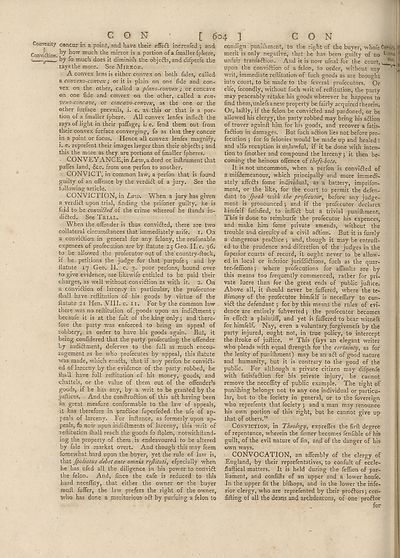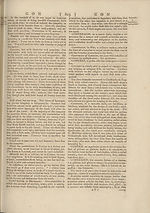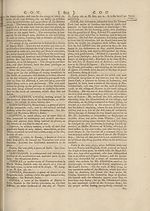Encyclopaedia Britannica, or, a Dictionary of arts, sciences, and miscellaneous literature : enlarged and improved. Illustrated with nearly six hundred engravings > Volume 6, CHI-Crystallization
(650) Page 604
Download files
Complete book:
Individual page:
Thumbnail gallery: Grid view | List view

CON ' t 604 ] CON
Convexity concur in a point, and have their effect increafed j and
Conviction ^ ^°W muc^ rnjrror is a portion of a fmaller fphere,
w-—— by much does it diminilh the objects, and difperfe the
rays the more. See Mirror.
A convex lens is either convex on both fides, called
& convexo-convex; or it is plain on one fide and con¬
vex on the other, called a plano-convex; or concave
on one fide and convex on the other, called a con¬
vexo-concave, or concavo-convex, as the one or the
other furface prevails, i. e. as this or that is a por¬
tion of a fmaller fphere. All convex lenfes inflect the
rays of light in their paffage, i; e. fend them out from
their convex lurface converging, fo as that they concur
in a point or focus. Hence all convex lenfes magnify,
i. e. reprefent their images larger than their objects j and
this the more as they are portions of fmaller fpheres.
CONVEYANCE, in Law, a deed or inftrument that
paffes land, &c. from one perfon to another.
CONVICT, in common law, a perfon that is found
guilty of an oft'ence by the verdidt of a jury. See the
following article.
CONVICTION, in Law. When a jury has given
a verdict upon trial, finding the prifoner guilty, he is
faid to be convifted of the crime whereof he Hands in¬
dicted. See Trial.
When the offender is thus convicted, there are two
collateral circumftances that immediately arife. 1. On
a conviction in general for any felony, the reafonable
expences of profecution are by ftatute 25 Geo. II. c. 36.
io be allowed the profecutor out of the country-flock,
it he petitions the judge for that purpofe ; and by
ilatute xy Geo. II. c. 3. poor perfons, bound over
to give evidence, are likevvife entitled to be paid their
charges, as wrell without conviction as with it. 2. On
a conviction of larceny in particular, the profecutor
fhall have reflitution of his goods by virtue of the
flalute 21 Elen. VIII. c. 11. For by the common law
there was no reflitution of goods upon an indictment j
becaufe it is at the fait of the king only j and there¬
fore the party was enforced to bring an appeal of
robbery, in order to have his goods again. But, it
being confidered that the party profecuting the offender
by indictment, deferves to the full as much encou¬
ragement as he who prcfecutes by appeal, this ftatute
was made, which enaCts, that if any perfon be convict¬
ed of larceny by the evidence of the party robbed, he
ihall have full reftitution of his money, goods, and
chattels, or the value of them out of the offender’s
goods, if he has any, by a writ to be granted by the
juftices. And the conftruCtion of this aCt having been
in great meafure conformable to the law of appeals,
it has therefore in praCtice fuperfeded the ufe of ap¬
peals of larceny. For inftance, as formerly upon ap¬
peals, fo new upon indictments of larceny, this writ of
leftitution fhall reach the goods fo flolen, notwith(land¬
ing the property of them is endeavoured to be altered
by fale in market overt. And though this may feem
fomewhat hard upon the buyer, yet the rule of law is,
that fpohatus debet ante omnia rejlituti, efpecial’ly when
he has ufed all the diligence in his power to conviCt
the felon. And, fince the cafe is reduced to this
hard neceffity, that either the owner or the buyer
mult fuffer, the lav/ prefers the right of the owner,
Y/ho has done a meritorious aCt by purfuing a felon to
condign punhhment, to the right of the buyer, vvhofe
merit is only negative, that he has been guilty of no
unfair tranfaCtion. And it is now ufual for the court., tlon-
upon the conviction of a felon, to order, without any
writ, immediate reftitution of fuch goods as are brought
into court, to be made to the feveral profecutors. Or
elfe, fecondly, without fuch writ of reftitution, the party
may peaceably retake his goods wherever he happens to
find them, unlefs a new property be fairly acquired therein.
Or, laftly, if the felon be convicted and pardoned, or be
allowed his clergy, the party robbed may bring his aCtion
of trover againft him for his goods, and recover a fatis-
faCtion in damages. But fuch aCtion lies not before pro¬
fecution j for fo felonies would be made up and healed :
and alfo recaption is unlawful, if it be done with inten¬
tion to fmother and compound the larceny j it then be¬
coming the heinous offence of theft-bote.
It is not uncommon, when a perfon is convicted of
a mifdemeanour, which principally and more immedi¬
ately affeCts fbme individual, as a battery, imprifon-
ment, or the like, for the court to permit the defen¬
dant to fpeah with the profecutor, before any judge¬
ment is pronounced j and if the profecutor declares
himfelf fatisfied, to infliCl but a trivial punifhment.
This is done to rermburfe the profecutor his expences,
and make him fome private amends, without the
trouble and circuity of a civil aCIion. But it is furely
a dangerous praCtice ; and, though it may be entruft-
ed to the prudence and diferetion of the judges in the
fuperior courts of record, it ought never to be allow¬
ed in local or inferior jurifdiCtions, fuch as the quar-
ter-fefiions; where profecutions for affaults are by
this means too frequently commenced, rather for pri¬
vate lucre than for the great ends of public juftice.
Above all, it (hould never be fuffered, where the te-
ftimony of the profecutor himfelf is neceffary to con¬
viCt the defendant j for by this means the rules of evi¬
dence are entirely fubverted; the profecutor becomes
in effeCt a plaintiff, and yet is fuffered to bear witnefs
for himfelf. Nay, even a voluntary, forgivenefs by the
party injured, ought not, in true policy, to intercept
the ftroke of juftice. “ This (fays an elegant writer
who pleads with equal firength for the certainty, as for
the lenity of punilhment) may be an aCt of good nature
and humanity, but it is contrary to the good of the
public. For although a private citizen may difpenfe
with fatisfaCIion for his private injury, he cannot
remove the neceffity of public example. The right of
puniihing belongs not to any one individual or particu-
lar, but to the fociety in general, or to the fovereign
who reprefents that fociety ; and a man may renounce
his own portion of this right, but he cannot give up
that of others.”
Conviction, in Theology, expreffes the firft degree
of repentance, wherein the finner becomes fenfible of his
guilt, of the evil nature of fin, and of the danger of his
own ways.
CONVOCATION, an affembly of the clergy of
England, by their reprefentatives, to confult of eccle-
fiaftical matters. It is held during the feffion of par¬
liament, and confifts of an upper and a lower houfe.
In the upper fit the biffiops, and in the lower the infe¬
rior clergy, who are reprefented by their pro&ors; con-
fifting of all the deans and archdeacons, of one proftor
for
Convexity concur in a point, and have their effect increafed j and
Conviction ^ ^°W muc^ rnjrror is a portion of a fmaller fphere,
w-—— by much does it diminilh the objects, and difperfe the
rays the more. See Mirror.
A convex lens is either convex on both fides, called
& convexo-convex; or it is plain on one fide and con¬
vex on the other, called a plano-convex; or concave
on one fide and convex on the other, called a con¬
vexo-concave, or concavo-convex, as the one or the
other furface prevails, i. e. as this or that is a por¬
tion of a fmaller fphere. All convex lenfes inflect the
rays of light in their paffage, i; e. fend them out from
their convex lurface converging, fo as that they concur
in a point or focus. Hence all convex lenfes magnify,
i. e. reprefent their images larger than their objects j and
this the more as they are portions of fmaller fpheres.
CONVEYANCE, in Law, a deed or inftrument that
paffes land, &c. from one perfon to another.
CONVICT, in common law, a perfon that is found
guilty of an oft'ence by the verdidt of a jury. See the
following article.
CONVICTION, in Law. When a jury has given
a verdict upon trial, finding the prifoner guilty, he is
faid to be convifted of the crime whereof he Hands in¬
dicted. See Trial.
When the offender is thus convicted, there are two
collateral circumftances that immediately arife. 1. On
a conviction in general for any felony, the reafonable
expences of profecution are by ftatute 25 Geo. II. c. 36.
io be allowed the profecutor out of the country-flock,
it he petitions the judge for that purpofe ; and by
ilatute xy Geo. II. c. 3. poor perfons, bound over
to give evidence, are likevvife entitled to be paid their
charges, as wrell without conviction as with it. 2. On
a conviction of larceny in particular, the profecutor
fhall have reflitution of his goods by virtue of the
flalute 21 Elen. VIII. c. 11. For by the common law
there was no reflitution of goods upon an indictment j
becaufe it is at the fait of the king only j and there¬
fore the party was enforced to bring an appeal of
robbery, in order to have his goods again. But, it
being confidered that the party profecuting the offender
by indictment, deferves to the full as much encou¬
ragement as he who prcfecutes by appeal, this ftatute
was made, which enaCts, that if any perfon be convict¬
ed of larceny by the evidence of the party robbed, he
ihall have full reftitution of his money, goods, and
chattels, or the value of them out of the offender’s
goods, if he has any, by a writ to be granted by the
juftices. And the conftruCtion of this aCt having been
in great meafure conformable to the law of appeals,
it has therefore in praCtice fuperfeded the ufe of ap¬
peals of larceny. For inftance, as formerly upon ap¬
peals, fo new upon indictments of larceny, this writ of
leftitution fhall reach the goods fo flolen, notwith(land¬
ing the property of them is endeavoured to be altered
by fale in market overt. And though this may feem
fomewhat hard upon the buyer, yet the rule of law is,
that fpohatus debet ante omnia rejlituti, efpecial’ly when
he has ufed all the diligence in his power to conviCt
the felon. And, fince the cafe is reduced to this
hard neceffity, that either the owner or the buyer
mult fuffer, the lav/ prefers the right of the owner,
Y/ho has done a meritorious aCt by purfuing a felon to
condign punhhment, to the right of the buyer, vvhofe
merit is only negative, that he has been guilty of no
unfair tranfaCtion. And it is now ufual for the court., tlon-
upon the conviction of a felon, to order, without any
writ, immediate reftitution of fuch goods as are brought
into court, to be made to the feveral profecutors. Or
elfe, fecondly, without fuch writ of reftitution, the party
may peaceably retake his goods wherever he happens to
find them, unlefs a new property be fairly acquired therein.
Or, laftly, if the felon be convicted and pardoned, or be
allowed his clergy, the party robbed may bring his aCtion
of trover againft him for his goods, and recover a fatis-
faCtion in damages. But fuch aCtion lies not before pro¬
fecution j for fo felonies would be made up and healed :
and alfo recaption is unlawful, if it be done with inten¬
tion to fmother and compound the larceny j it then be¬
coming the heinous offence of theft-bote.
It is not uncommon, when a perfon is convicted of
a mifdemeanour, which principally and more immedi¬
ately affeCts fbme individual, as a battery, imprifon-
ment, or the like, for the court to permit the defen¬
dant to fpeah with the profecutor, before any judge¬
ment is pronounced j and if the profecutor declares
himfelf fatisfied, to infliCl but a trivial punifhment.
This is done to rermburfe the profecutor his expences,
and make him fome private amends, without the
trouble and circuity of a civil aCIion. But it is furely
a dangerous praCtice ; and, though it may be entruft-
ed to the prudence and diferetion of the judges in the
fuperior courts of record, it ought never to be allow¬
ed in local or inferior jurifdiCtions, fuch as the quar-
ter-fefiions; where profecutions for affaults are by
this means too frequently commenced, rather for pri¬
vate lucre than for the great ends of public juftice.
Above all, it (hould never be fuffered, where the te-
ftimony of the profecutor himfelf is neceffary to con¬
viCt the defendant j for by this means the rules of evi¬
dence are entirely fubverted; the profecutor becomes
in effeCt a plaintiff, and yet is fuffered to bear witnefs
for himfelf. Nay, even a voluntary, forgivenefs by the
party injured, ought not, in true policy, to intercept
the ftroke of juftice. “ This (fays an elegant writer
who pleads with equal firength for the certainty, as for
the lenity of punilhment) may be an aCt of good nature
and humanity, but it is contrary to the good of the
public. For although a private citizen may difpenfe
with fatisfaCIion for his private injury, he cannot
remove the neceffity of public example. The right of
puniihing belongs not to any one individual or particu-
lar, but to the fociety in general, or to the fovereign
who reprefents that fociety ; and a man may renounce
his own portion of this right, but he cannot give up
that of others.”
Conviction, in Theology, expreffes the firft degree
of repentance, wherein the finner becomes fenfible of his
guilt, of the evil nature of fin, and of the danger of his
own ways.
CONVOCATION, an affembly of the clergy of
England, by their reprefentatives, to confult of eccle-
fiaftical matters. It is held during the feffion of par¬
liament, and confifts of an upper and a lower houfe.
In the upper fit the biffiops, and in the lower the infe¬
rior clergy, who are reprefented by their pro&ors; con-
fifting of all the deans and archdeacons, of one proftor
for
Set display mode to:
![]() Universal Viewer |
Universal Viewer | ![]() Mirador |
Large image | Transcription
Mirador |
Large image | Transcription
Images and transcriptions on this page, including medium image downloads, may be used under the Creative Commons Attribution 4.0 International Licence unless otherwise stated. ![]()
| Permanent URL | https://digital.nls.uk/193015873 |
|---|
| Attribution and copyright: |
|
|---|
| Description | Ten editions of 'Encyclopaedia Britannica', issued from 1768-1903, in 231 volumes. Originally issued in 100 weekly parts (3 volumes) between 1768 and 1771 by publishers: Colin Macfarquhar and Andrew Bell (Edinburgh); editor: William Smellie: engraver: Andrew Bell. Expanded editions in the 19th century featured more volumes and contributions from leading experts in their fields. Managed and published in Edinburgh up to the 9th edition (25 volumes, from 1875-1889); the 10th edition (1902-1903) re-issued the 9th edition, with 11 supplementary volumes. |
|---|---|
| Additional NLS resources: |
|

